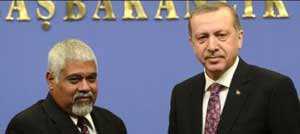Soner Cagaptay
Also available in العربية
The Atlantic
December 11, 2012
Don’t look to Ankara to be a model for the new Islamist governments of the Arab Spring.
It is 5 a.m. in Istanbul, and I am looking for coffee. Having arrived in Istanbul’s old city the night before and seriously jetlagged, I decided to walk into the Eyup quarter, which hosts Istanbul’s most sacred mosque, Eyup Sultan. I hoped the revered shrine, which attracts early morning worshippers, would have an open coffee shop nearby, and I was right. As prayers ended, I watched Eyup’s worshipers flow from the mosque, sipping a bland cup of instant coffee, unaware I was about to be treated to an experience of cultural flavor unique to Turkey.
A large group of Salafists, with their trademark trimmed beards and kaftans, walked out of the mosque, heading to my coffee shop. What happened next is a lesson in Turkey’s distinctive direction compared to its Muslim neighbors: The Salafist men ordered coffee and Turkish bagels (simit) from the barista, a young woman sporting a tattoo and sleeveless shirt. Neither the exchange between the barista and the Salafists, laden with polite honorifics and formal Turkish speech, nor their body language, suggested tensions between the two opposing visions of Turkey brought into close encounter for me to witness.
As this encounter so succinctly encapsulates, Turkey’s two halves are like oil and water; though they may not blend, neither will disappear. Turkey’s Islamization is a fact, but so is secular and Westernized Turkey. But the historical roots and current manifestations of this synthesis indicate that it is a model that will be difficult to replicate elsewhere in the region, as Islamist governments rise to power after the Arab Spring.
Starting with the late 18th century, Turkey went through two centuries of societal and structural Westernization under the Ottoman sultans, a unique experience among Muslim societies to this day. The Ottomans considered their state a European one, and borrowed European institutions, setting up women’s colleges and building secular schools and courts, to catch up with the continent. Enter young Mustafa Kemal Ataturk, who imbibed the secular mindset in such Ottoman schools. The sultans’ rule was followed by eight decades of constitutional secularism installed by Ataturk during the 20th century. This campaign, unique among Muslim-majority Middle East societies, mandated strict separation of religion, government, and education.
Since coming to power in 2002, the Justice and Development Party (AKP) government, rooted in Islamism, has challenged these premises, and the firewall between religion, politics, and education has collapsed. The result has been a rising tide of Islamization in Turkey. Take for example, a recent law that mandates the teaching of religion in public schools for nine-year-old children. What is more, Turkey now has a different identity. It considers itself Middle Eastern, rather than European, and views other Muslim countries as brother nations. This is a far cry from Ataturk’s vision that viewed Turkey as a European country, only accidentally placed in the Middle East.
Turkey’s Islamization is old news. But what is new — as demonstrated by my encounter at the coffee shop — is that such Islamization is taking place within the constraints of pre-existing and institutionalized Westernization, a feature unique to Turkey among its Muslim neighbors in the Middle East. The country is so thoroughly westernized that even the AKP and its Islamist elites cannot escape trappings of their Western mold. From the role of women in society, to the country’s membership in the NATO alliance, Turkey’s western legacy is an insurmountable fact. Perhaps most importantly, it is Turkey’s embrace of liberal economics that has driven the AKP to the top in the first place.
Regardless of how Islamicized Turkey becomes, it will be impossible to take women out of the public space. Women’s participation in public life, so deeply engrained in secularist Turkey, is also a trademark of the new Turkey. Consider Turkey’s first lady Hayrunnisa Gul, the wife of President Abdullah Gul. The Turkish first lady has a very public presence, runs her own policy initiatives, and her website appears to be a mirror image of the White House website set up for Michelle Obama.
When it comes to the country’s foreign policy orientation, Turkey’s Islamization is meeting its match as well. To be sure, the new Turkey does not consider itself a de facto member of the Western world, but neither does it consider itself antithetical to the West, as it did until a few years ago. This point was underlined during Turkey’s recent debate on deploying NATO Patriot missiles on Turkish territory against Syria. This happened without significant domestic opposition: The Turks have lived with NATO too long to think outside of its box.
This is where Turkey’s structural Westernization — its institutional connections to the West and its adoptions of Western ways — makes a difference compared to other Muslim-majority societies in the region. It is hard to imagine that NATO presence would be so welcome in other Muslim majority countries. Even the most diehard Islamists in Turkey had reason to support the NATO alliance because it is what protected Turkey against “godless” communism.
As a Muslim country that takes NATO seriously, the new Turkey’s foreign policy falls somewhere between Ataturk’s Turkey and the AKP’s vision. Regional instability has made Turkey’s access to NATO a valuable asset, hence Ankara’s pivot towards Washington and away from the lofty notion of Muslim solidarity. This has been most significantly demonstrated by Turkey’s 2010 decision to join NATO’s missile defense project that aims to protect alliance members against missiles coming from Iran, hardly an expression of solidarity with a Muslim nation. The civil war in Syria has accelerated Ankara’s run for cover under NATO’s embrace: when Damascus shot down a Turkish place in June, Turkey swiftly asked the Western alliance to come to its assistance. Further unrest in the Middle East and competition against Iran in Iraq and Syria will only increase Ankara’s pivot towards the United States and NATO.
All this suggests that Turkey’s Islamization is bound by the country’s deep-rooted and institutional traditions of Westernization, as well as continued regional instability. Accordingly, Turkey and its Muslim neighbors in the Middle East may be heading in different directions. Countries such as Egypt lack Turkey’s institutional westernization experience and constitutionally-mandated secular heritage, and are therefore more susceptible to thorough Islamization. In Turkey, Islamization will be tempered by the unique heritage of institutional and structural westernization. This has ushered in a blend of Western ways and Islamist politics — a first anywhere in the world.
Sheer numbers require this culture of co-existence, if not tolerance, to take root. In the most recent 2011 elections, the AKP received nearly 50 percent of the vote. Excluding the 15 percent of the voters that supported other Islamist and conservative parties, 35 percent of the population, totaling twenty-five million people, did not vote for the AKP. These voters stand for secularism, and they will never buy into the religious movement in Turkey. This block will constitute the domestic limitation of Turkey’s Islamization. After ten years in power, and likely to run the country for another term with a humming economy boosting its support, the AKP is making Turkey in its own image. But the new Turkey will have a uniquely distinct flavor: a bit Islamist, a bit secularist, a bit conservative, and a bit Western.
Soner Cagaptay is the Beyer Family fellow and director of the Turkish Research Program at The Washington Institute.






